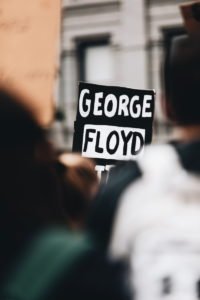
By Ben Crump
Ben Crump is a civil rights and trial attorney and founder of Ben Crump Law, headquartered in Washington, D.C.
George Floyd’s close-to-last words in life — “I can’t breathe” — capture perfectly how so many black Americans feel in watching the slow, grueling video of his death.
Another black person killed. Another heartbreaking death caught on video — this time with a crowd of witnesses calling for police restraint and pleading with officers to honor their oath and save his life.
Another grieving family. Another hashtag. It’s no wonder we can’t breathe. This cascade of recent cases — Ahmaud Arbery, jogging while black; Breonna Taylor, sleeping while black; and most recently, George Floyd, encountering police while black — has sharpened the focus of all Americans on two inescapable realities: Our society and its institutions place a perilously low value on black lives, and it’s inherently dangerous to be black in America.
That the life of George, whose family I represent, was so disposable for not one but four police officers, even with witnesses watching and pleading for him, underscores the daily, disproportionate risk that all black people feel just by virtue of being black.
For a free legal consultation, call 800-657-1881
If not for the omnipresence of video evidence, these deaths would be swept under the rug. The stories would be twisted. The victims would be blamed. And justice would slip away. But we can’t unsee the eight minutes of that officer’s knee on George’s neck, leading to his slow, torturous death. We watch George lying helpless on the ground, calling out for his mother, and we imagine ourselves, our brothers or sisters, sons or daughters in his place.
And then we hear that nagging thought that keeps coming back and demanding us to face it: How many more deaths have not been captured on video? How long has this been going on without witnesses or documentation? Is this an outlier or is this endemic? And it starts to feel like genocide.
George Floyd’s public execution has provoked a deep grieving among black Americans that can only be assuaged by soul-searching, heart-rending change.
Swiftly firing the police officers who killed or aided in the killing of George is a start. Prosecuting them is better. Fixing the police culture that made it possible is better yet.
Grief and anger propelled hundreds of protesters onto the streets of Minneapolis this week. I joined George’s family in calling for protests to be peaceful and for protesters to observe proper social distancing. We cannot sink to the level of our oppressors, and we cannot endanger each other even as we respond to the necessary urge to raise our voices in unison and in outrage.
Click to contact our personal injury lawyers today
But city leaders need to understand that the community’s grief over the horrific killing of George demands more than condemnation and personnel action. The city must own this. One officer may act in rogue fashion. Three more officers watching an execution go down and doing nothing is a sign of a deeper problem.
Complete a Free Case Evaluation form now
To assuage this death and begin the community’s healing, city and police leaders need to look at the culture they’ve created and ask the hard questions: How did our recruitment, our values, our training, our policies and our procedures collectively fail to the extent that four officers inflicted or accepted a fatal civil rights violation? Why did no one speak up despite pleas to save George? Where was the humanity? Where was the ethic to protect and serve?
The Minneapolis Police Department received at least seven prior complaints against Derek Chauvin, the officer who fatally pressed his knee into George’s neck, but closed the cases without taking disciplinary action. He was involved in multiple fatal shootings, earning him a place on a report by Communities United Against Police Brutality called “Stolen Lives in Minnesota: People Who Have Lost their Lives through Encounters with Law Enforcement Authorities.”
The city needs to re-examine those complaints and incidents and see what it might have previously detected about the character of this officer if it had only been looking. And it needs to put processes in place that root out anyone wearing a badge with a tendency toward brutality, racism, abuse of power or excessive use of force.
This is a moment for deep reflection and fundamental change. What implicit biases fester to put black Americans at risk? How much do we truly value black lives when we really look at the evidence? And what can we do to correct course?
It’s a moment for all Americans to take a hard look in the mirror, change themselves and demand change from their institutions. Only then will we be able to breathe again.
Call or text 800-657-1881 or complete a Free Case Evaluation form




